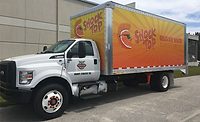Beverage fleets rewrite their playbooks during unprecedented times
With on-premise accounts silent, wholesalers see boost from off-premise network

The COVID-19 pandemic has forced beverage distribution operations across the country to pivot and rethink most of their day-to-day operations. And though the end of this “new normal” can’t come too soon, most fleet operators have, for the most part, been able to adapt.
“Needless to say, it’s been far from business as usual,” says Ed Pritchard, senior vice president of fleet operations for Silver Eagle Distributors, Houston. “We are considered an essential business. As such our drivers, warehouse personnel, maintenance technicians, key management and others have and continue to work straight through the entire pandemic.”
Drivers at all locations used to be required to sign out truck keys every morning, meaning they’d have to check in at the parts counter to sign an accountability document and retrieve the keys from a designated individual. But, since the pandemic started, Pritchard’s team found a secure method to leave the keys in the trucks and avoid unexpected loss or theft.
Naturally, everyone’s wearing the required PPE (masks, gloves, etc.) and carrying all necessary hand cleaners and sanitary wipes.
Silver Eagle also has instructed drivers to wipe down all high touch-point areas such as steering wheels, gear selector, door handles and other controls when they bring the vehicles in for scheduled service. When the service is complete, technicians complete the same routine.
The distributor also is replacing cabin filters much more frequently, versus the previous one-time-a-year schedule.
Additionally, parts procurement has changed dramatically, as vendors and service providers no longer are allowed on the property without an appointment.
“Vehicles that are presumed to be contaminated have been parked in a designated quarantine area until they can be disinfected and certified ‘safe’ by a third-party service provider,” Pritchard notes.
Powers Distributing in Orion, Mich., had to quarantine a driver for 14 days after servicing a retail account that had an employee who had tested positive for COVID-19. “The driver was in and out of the truck [at the account],” recalls Powers General Manager and Executive Vice President Gary Thompson. “We put guys in full-body hazmat suits, including face shields and gloves, and they literally go through the entire truck with sanitizing spray and wipes and clean the entire inside of the trucks and won’t let anyone back into the truck until it’s done.”
Currently, the state of Michigan isn’t allowing distributors to retrieve empty kegs sitting at dormant on-premise accounts, but when that restriction is lifted, the Powers team will be collecting those in full hazmat attire.
Needless to say, Powers’s on-premise volume has dropped 99.5 percent, but the off-premise has been up double digits during the pandemic period to offset that decline.
For a small, craft-only distributor like Bounty Beverage in Nashville, Tenn., the on-premise hit can be devastating, as founder Kurt Strickmaker says bars and restaurants represent 60 percent of his business. Luckily, Bounty’s off-premise sales, like Powers’s, has been up significantly—about 35 percent. During that time, Bounty’s been taking most of the same precautions that its much larger peers have been.
“Every night we spray this super-badass chemical in the trucks where we shut the door and it kills virtually any virus in there, including COVID-19 — we do this on anything the drivers would have touched,” Strickmaker says.
Over-the-road drivers are barred from entering the offices.
“Early on we were asking our drivers to have as little interaction with office people as possible,” Strickmaker says. “Those people are going out to collect cash and checks and we’ve got to scan those checks, so everyone’s sanitizing like a beast.”
Looking for a reprint of this article?
From high-res PDFs to custom plaques, order your copy today!





